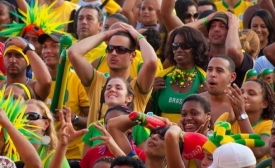soccer
Qatar’s World Cup organizers view this ground as a blank canvas for a new era in the Middle East, a way to advance their society and use soft power—i.e., the world’s most popular sport—to promote the country’s foreign policy.

Listen to CPD's interview with Roger Kittleson about The Country of Football: Soccer and the Making of Modern Brazil.

An overview of CPD's most popular blogs last month on topics ranging from Iranian soccer diplomacy to Turkey's Armenian initiative.
By escaping from the Group of Death at the World Cup, the United States finally gave the lie to the notion that Americans were bad at soccer. Except Americans were never bad at soccer. The good soccer players just didn't know they were Americans.
Soccer used to be their game -- the Europeans, the South Americans, the Africans. Today it is our game too, bringing the nation together in a passionate embrace of its athleticism, its skill and, yes, its excitement. But it hasn't always been this way. Even after the U.S. hosted the World Cup for the first time in 1994 -- setting attendance records that still stand today -- many still dismissed soccer as somehow not quite American.
When al Shabaab, the violent Islamist group in Somalia, took control of the capital city Mogadishu, it actively destroyed buildings and overt displays of Western institutions and influences. This included outlawing soccer. The group destroyed cinemas and viewing centers in Mogadishu during the 2010 World Cup to stop residents from watching the matches. Their first successful international attack was the twin explosions in Uganda’s capital Kampala at viewing stations during the tournament.
In England, it was called the Tebbit Test. The right-wing politician Norman Tebbit suggested in 1990 that immigrants from South Asia, Africa, and the Caribbean would not be truly assimilated until they supported their new country, rather than their respective homelands, in cricket. Thankfully, we have no such test in the United States; in a nation of immigrants, plenty of people feel allegiance to more than one team. But why is the American World Cup squad winning over more and more people with strong links to other nations?
When American fans win a major sporting event, they often like to celebrate by turning over cars and burning everything in sight. When Japanese teams lose, it turns out that fans commiserate by cleaning the stadium. On Saturday, Japan lost its first World Cup match with the Ivory Coast by 2-1. While that could have been a demoralizing start for most sports enthusiasts, a bunch of Japanese fans who attended the event at Arena Pernambuco in Recife, Brazil decided to respond with an unbelievably classy move: cleaning up the stadium.







